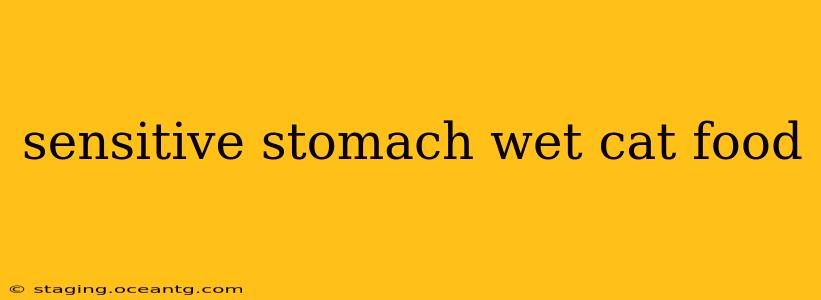Many cat owners face the frustrating challenge of finding the right food for their feline companions, especially those with sensitive stomachs. Digestive upset in cats can manifest in various ways, including vomiting, diarrhea, gas, and changes in appetite. Choosing the right wet food can significantly improve their comfort and overall health. This guide explores the key aspects of selecting sensitive stomach wet cat food, addressing common concerns and offering valuable insights for informed decision-making.
What Causes Sensitive Stomachs in Cats?
Several factors can contribute to a cat's sensitive stomach. These include food allergies or intolerances (common culprits are beef, dairy, wheat, soy, and chicken), parasites (like worms), bacterial or viral infections, inflammatory bowel disease (IBD), pancreatitis, and even stress. Sudden dietary changes can also trigger digestive upset. Understanding the underlying cause is crucial for effective management, so consulting your veterinarian is essential if your cat experiences persistent digestive issues.
How to Choose the Right Sensitive Stomach Wet Cat Food?
Selecting the appropriate wet food for a cat with a sensitive stomach requires careful consideration of several key factors:
1. Ingredient Quality and Simplicity: Look for foods with high-quality protein sources, such as easily digestible proteins like chicken, turkey, or fish (if no allergies are present). Avoid foods with fillers, artificial colors, flavors, and preservatives. The fewer ingredients, the better, especially for cats with sensitivities. Opt for foods that clearly list the protein source as the primary ingredient.
2. Prebiotic and Probiotic Content: Prebiotics act as food for beneficial gut bacteria, while probiotics introduce beneficial bacteria directly into the gut. Foods containing these can help support a healthy gut microbiome and improve digestion.
3. Limited Ingredient Diets: These diets usually contain only a few easily digestible protein sources and carbohydrates. They are specifically designed to minimize the risk of allergic reactions.
4. Hydrolyzed Protein: In severe cases of food allergies, hydrolyzed protein diets can be beneficial. These diets break down proteins into smaller peptides, making them less likely to trigger an allergic reaction.
5. Grain-Free Options: Many cats experience digestive issues due to grain sensitivities. Grain-free options can be beneficial but always consult your veterinarian first, as some grain-free diets have been associated with heart disease in certain cats.
6. Digestive Enzymes: Some foods incorporate digestive enzymes (like protease or lipase) to assist with the breakdown of food and improve nutrient absorption.
What are the best wet cat foods for sensitive stomachs?
This is a question best answered by your veterinarian. There is no single "best" food, as individual cats react differently to various ingredients. Your vet can help you determine the underlying cause of your cat's digestive problems and recommend a suitable diet based on their specific needs. They may also suggest a food elimination trial to identify potential allergens.
Are there homemade wet food options for sensitive stomachs?
While homemade food can be an option, it's crucial to ensure it's nutritionally balanced to meet all your cat's needs. Improperly balanced diets can lead to deficiencies and health problems. Consulting with a veterinary nutritionist is highly recommended if you are considering preparing homemade food for your cat. They can help create a recipe that is safe, nutritious, and tailored to your cat's specific needs.
My cat is vomiting after eating wet food, what should I do?
Vomiting is a common symptom of digestive upset. If your cat vomits occasionally, observe the frequency and severity. If vomiting is persistent, frequent, or accompanied by other symptoms (like diarrhea, lethargy, or weight loss), seek veterinary attention immediately.
Can I switch my cat's food gradually to a sensitive stomach formula?
Yes, it's crucial to transition your cat gradually to a new food to avoid further digestive upset. A slow transition period typically takes 7-10 days, gradually increasing the proportion of the new food while decreasing the amount of the old food.
My cat has diarrhea, is it related to their food?
Diarrhea can certainly be food-related, but other causes include infections, stress, and underlying medical conditions. Consult your veterinarian to determine the cause of your cat's diarrhea and develop an appropriate treatment plan.
By carefully considering these factors and consulting with your veterinarian, you can confidently select a sensitive stomach wet cat food that will promote your feline companion's digestive health and overall well-being. Remember, consistency in diet is also key to maintaining a healthy digestive system for your cat.
